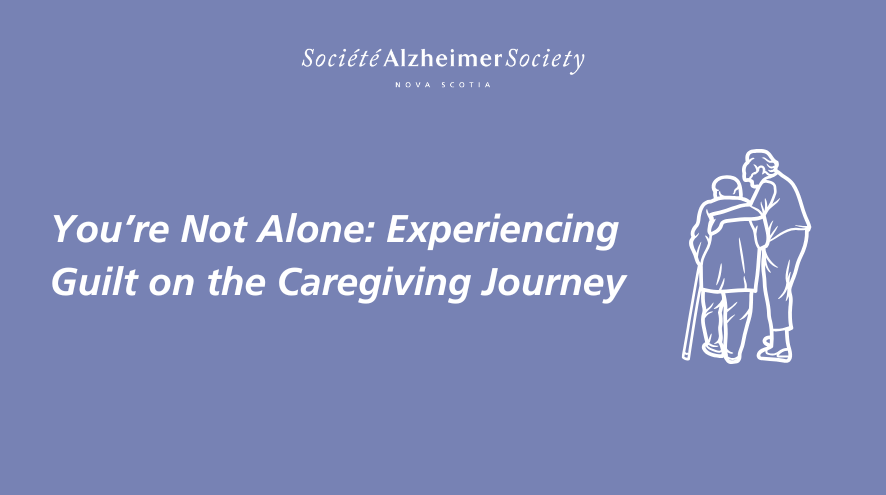You’re Not Alone: Experiencing Guilt on the Caregiving Journey

You’re Not Alone: Experiencing Guilt on the Caregiving Journey
Originally published in the Cape Breton Post
Caring for someone living with dementia comes with a wide range of emotions, often including guilt. Some days, care partners can feel like they’re not doing a good enough job or may find it hard to accept help. These feelings are normal and you’re not alone if you’re feeling them.
Guilt is a feeling that you have done something wrong or have not done enough. There are different triggers for guilt that care partners experience. It’s important to acknowledge these feelings so you can begin to work through them. In this article, I’ll go through some common situations that can lead to guilt and provide some guidance and reflection.
Care partners may feel guilt over how they treated the person they’re caring for before they were diagnosed with dementia. You may have been irritated or frustrated with how they were acting.
It’s important to remember that you didn’t know they had dementia and there’s no way you could have predicted the future. Some symptoms of dementia include changes in behaviour and personality. Learning more about dementia can help you understand the symptoms and how to respond to these changes.
It’s common for a care partner to feel frustrated at times, and this may come out while communicating to the person who has dementia. Caregiving can be stressful and feeling frustrated is a natural response. How you reacted to a situation might make you feel guilty, and you may have trouble coping with this.
Remember, you’re not alone in this. Taking some time for yourself can help to reduce stress. When you feel yourself getting frustrated, it’s okay to leave the room for a few minutes.
Care partners not only want time apart from the person they’re caring for, they need it. You may feel guilty taking some time away to recharge and do things that you enjoy, but doing this will fill your cup, and in turn make you better able to care for your person.
If the person you’re caring for can’t be left alone, don’t be afraid to ask friends or family, or to look into what’s available for respite care and adult day programs which provide a safe environment and social activities.
Even the act of accepting help may come with additional feelings of guilt. You might feel like you ‘should’ be able to manage your caregiving duties on your own, but everyone needs help sometimes. It’s always okay to ask for, and accept, the help you need.
There may come a time when you have to consider moving the person you’re caring for into long-term care, and this often comes with a lot of guilt. Care partners often feel like they’re letting the person down or like they’re breaking a promise they may have made to keep the person home. These feelings are completely normal.
Remember that you were in a different place when you made that promise, and it’s okay to accept that you can no longer fulfill it. Moving to long-term care doesn’t mean that you’re giving up caregiving completely, you’ll just be doing it in a different way.
Talking with people who are experiencing similar things can be very helpful in managing all the emotions that come with caregiving. In Cape Breton, Caregiver Support Groups are available in-person in Sydney and North Sydney, with additional groups meeting virtually. Learn more at www.alzheimer.ca/ns/caregiver-support-groups.
If you need support, we’re here to help you. Call our Dementia Helpline at 1-800-611-6345.
